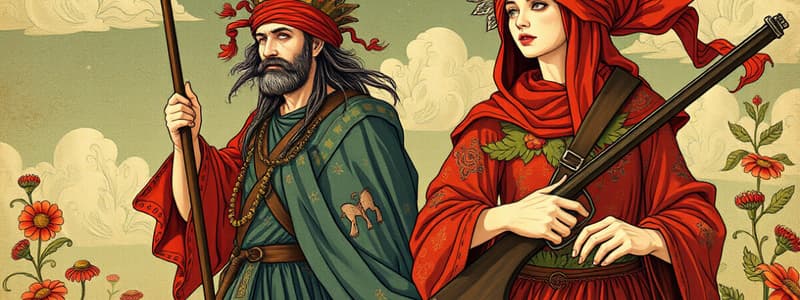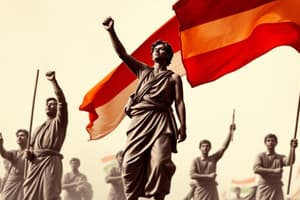Podcast
Questions and Answers
What primarily motivates freedom fighters in their resistance efforts?
What primarily motivates freedom fighters in their resistance efforts?
- Desire to gain power for themselves
- Desire for social, political, or national liberation (correct)
- Desire for personal gain
- Desire for global dominance
Which of the following methods is known for embracing peaceful demonstrations and civil disobedience?
Which of the following methods is known for embracing peaceful demonstrations and civil disobedience?
- Guerrilla warfare
- Armed struggle
- Political activism
- Nonviolent protest (correct)
Which historical figure is best known for leading nonviolent resistance against colonial rule?
Which historical figure is best known for leading nonviolent resistance against colonial rule?
- Mahatma Gandhi (correct)
- Nelson Mandela
- George Washington
- Che Guevara
How is the term 'freedom fighter' often perceived?
How is the term 'freedom fighter' often perceived?
Which method involves engaging in political processes to advocate for change?
Which method involves engaging in political processes to advocate for change?
What is a notable characteristic of freedom fighters?
What is a notable characteristic of freedom fighters?
Nelson Mandela's approach to fighting against apartheid included which of the following methods?
Nelson Mandela's approach to fighting against apartheid included which of the following methods?
What ongoing debate surrounds freedom fighters and their methods of resistance?
What ongoing debate surrounds freedom fighters and their methods of resistance?
Flashcards are hidden until you start studying
Study Notes
Definition
- A freedom fighter is an individual who actively engages in resistance against oppressive regimes or forces.
- Typically motivated by a desire for social, political, or national liberation.
Characteristics
- Often considered heroes by supporters and terrorists by opponents.
- Can use various methods of resistance, from nonviolent protests to armed struggle.
- Driven by ideological beliefs, nationalism, or human rights advocacy.
Historical Context
- Common during colonial struggles, wars of independence, and civil rights movements.
- Examples include figures like Mahatma Gandhi, Nelson Mandela, and Che Guevara.
Methods of Resistance
-
Nonviolent Protest
- Peaceful demonstrations, strikes, and civil disobedience.
- Emphasized by leaders like Gandhi in India.
-
Armed Struggle
- Use of military tactics to overthrow unjust governments.
- Seen in movements like the Cuban Revolution.
-
Political Activism
- Engaging in political processes to advocate for change.
- Involves lobbying, campaigning, and forming political parties.
Notable Examples
- Mahatma Gandhi: Led nonviolent resistance against British colonial rule in India.
- Nelson Mandela: Fought against apartheid in South Africa through both peaceful means and later armed struggle.
- Che Guevara: A key figure in the Cuban Revolution, advocating for guerrilla warfare against imperialism.
Controversies
- The label of "freedom fighter" is subjective and can vary based on perspective.
- Actions deemed heroic by some may be viewed as terrorism by others.
- Ongoing debate about the ethics of violent resistance versus nonviolent approaches.
Conclusion
- Freedom fighters play a significant role in shaping political landscapes.
- Their legacies influence contemporary struggles for justice and equality worldwide.
Definition
- Freedom fighters actively resist oppressive regimes, motivated by social, political, or national liberation.
Characteristics
- Viewed as heroes by supporters; labeled as terrorists by opponents.
- Employ diverse resistance methods: from nonviolent protests to armed conflict.
- Driven by ideologies, nationalism, or human rights advocacy.
Historical Context
- Frequently emerge during colonial struggles, independence wars, and civil rights movements.
- Notable figures include Mahatma Gandhi, Nelson Mandela, and Che Guevara.
Methods of Resistance
- Nonviolent Protest:
- Utilizes peaceful demonstrations, strikes, and civil disobedience.
- Significantly exemplified by Gandhi's campaigns in India.
- Armed Struggle:
- Involves military tactics to challenge and overthrow unjust governments.
- Prominent in movements such as the Cuban Revolution led by Che Guevara.
- Political Activism:
- Focuses on engaging in political processes promoting change.
- Entails activities like lobbying, campaigning, and forming political parties.
Notable Examples
- Mahatma Gandhi: Advocated for nonviolent resistance to British rule in India, leading to significant political change.
- Nelson Mandela: Opposed apartheid in South Africa using both peaceful protests and armed actions.
- Che Guevara: Influential in the Cuban Revolution, promoting guerrilla warfare against imperialist forces.
Controversies
- The term "freedom fighter" is subjective; it can vary greatly depending on perspective.
- Actions seen as heroic to some could be interpreted as terrorism by others.
- Ongoing debates surround the ethical implications of violent versus nonviolent resistance strategies.
Conclusion
- Freedom fighters significantly shape political landscapes and their legacies impact ongoing global struggles for justice and equality.
Studying That Suits You
Use AI to generate personalized quizzes and flashcards to suit your learning preferences.




